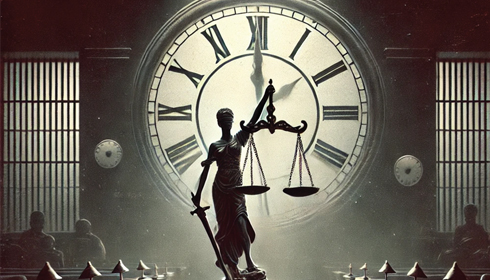
West Bengal: Home Guard Challenges Dismissal for posting Protest Song in Social Media
The recent events surrounding the firing of Home Guard Kashinath Panda have ignited a heated controversy over free speech, police transparency, and the responsibility of civic volunteers in public forums. Panda faced termination due to his social media sharing of a protest song and his challenge to Supreme Court orders regarding hospital security. Cases like Panda's, who worked as an officer at the Barrackpore Police Commissionerate, show how important it is to strike a balance between personal freedoms and government oversight.
Kashinath Panda, a hone guard for five years, lost his job after sharing a protest song online. A medical student at RG Kar Medical College was allegedly raped and murdered, and the song, which was posted in August 2024, requested justice for her. Panda sang a devotional song in which he pleaded with God to bring justice: "Mother, wield the sword; justice will come to the weak and helpless."
According to media reports, Many people took offence to the message once it went viral online. Panda claims that his superiors at the police station threatened him with bogus charges and the loss of his job if he did not remove the footage. His right to free speech, however, led him to reject the request. In spite of all these challenges, the video is still up on his social media page.
Panda received the official notice of termination on October 7. He then petitioned the Kolkata High Court, arguing that the dismissal violated his basic rights. "Does working in the police force mean I must forfeit my freedom to protest against injustice?" Panda asked. Next week, on Friday, his case is expected to be heard.
The Supreme Court recently issued a directive regarding the deployment of civic volunteers in sensitive sites, such as schools and hospitals. The Chief Justice-led Supreme Court bench determined that civic volunteers should not be stationed in such crucial areas following security breaches at RG Kar Medical College, where a volunteer named Sanjay Roy was implicated in the unfortunate occurrence involving the medical student.
Meanwhile, the Kolkata Police evacuated 29 civic volunteers from RG Kar Hospital even before the verdict. The regular police force received reinforcements from the city's police headquarters in Lalbazar, assuming security duties. There is still no citywide strategy to replace citizen volunteers at other public hospitals with paid staff, notwithstanding these developments at RG Kar.
Carrying out the Supreme Court's order for the police presents a practical problem. Public hospitals in Kolkata typically station twenty to thirty civic volunteers alongside police and house guards to ensure patient safety. The departure of civic volunteers raises questions about the efficacy of handling security in these institutions, especially considering the almost 6,000 open positions in the police force.
Problems with logistics and shifts in policy have resulted from the departure of civic volunteers. As an example, RG Kar Medical College has beefed up their security with 500 extra CCTV cameras. Previously, the hospital only utilized 199 cameras for partial coverage. Furthermore, in order to enhance security operations, the hospital's private security guards are now receiving specialized training. The state government is preparing to submit a report to the Supreme Court that will include reforms related to civic volunteers.
People are losing faith in the safety measures taken by civic volunteers just as the Supreme Court issues its verdict. The decision to start training volunteers in January, following the RG Kar tragedy, signals a change towards elevating the professionalism of civic forces.
Big questions about government and individual rights have arisen as a result of the interplay between Panda's case and the Supreme Court's orders. Panda's firing makes one wonder how safe it is for police officers to speak their minds without fear of retaliation. A bigger question that his case brings to light is whether or not public employees, such as police officers and civic volunteers, should be able to voice their personal opinions, particularly on issues of public importance, without facing repercussions.
The withdrawal of civic volunteers adds stress to an already understaffed police department, even while the Supreme Court's order seeks to avoid future security breaches. Hospitals and public spaces depend on these volunteers, and their sudden departure without adequate replacement plans would disrupt security operations.
Panda's legal battle will test the judiciary's understanding of the balance between administrative discipline and individual freedoms. It will also demonstrate the extent to which public officials can voice their thoughts without fear of retaliation. The Supreme Court's directives on civic volunteer deployments will shape public security strategies in sensitive city institutions.
As the court deliberates on these interrelated concerns, the cases underscore the challenges of protecting fundamental rights and maintaining peace. Future laws governing public institutions and the conduct of police personnel would be impacted by the verdicts of both the Kolkata High Court and the Supreme Court in these situations. Panda and others like him are fighting on behalf of their constitutional rights against the government.